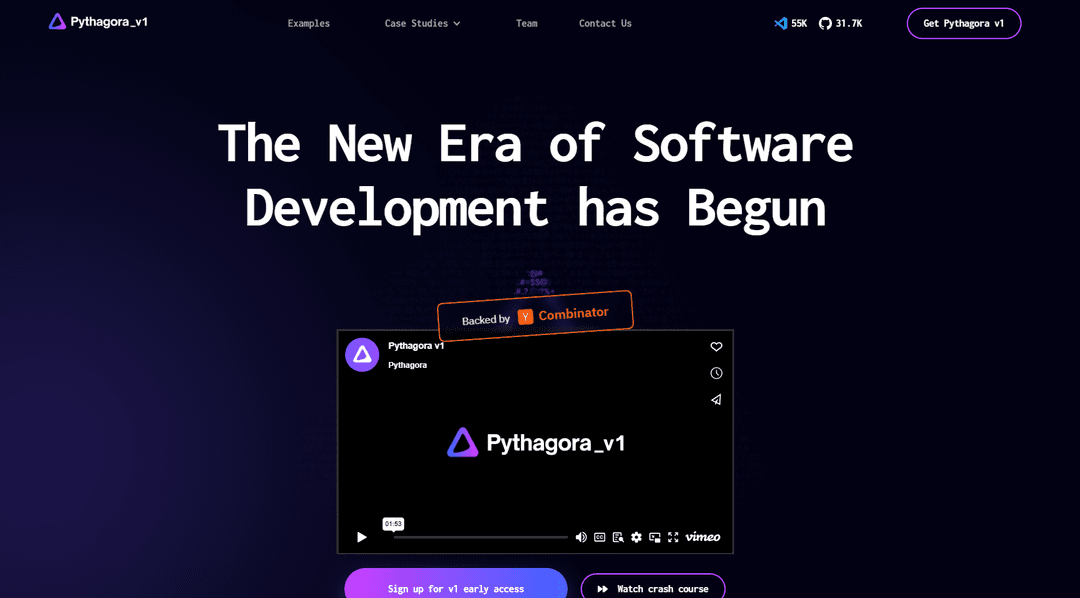Pythagora AI
Pythagora AI is an AI-powered development tool that enables developers to build production-ready, full-stack web applications through natural language conversation, handling 95% of the development work while requiring minimal human oversight.
https://www.pythagora.ai/

Product Information
Updated:Jul 16, 2025
Pythagora AI Monthly Traffic Trends
Pythagora AI achieved 37.1K visits in July, marking a 186.7% growth. The platform's June launch and its unique vibe coding approach, which includes 14 specialized AI agents for full-stack development, debugging, and deployment, likely contributed to this significant increase in traffic.
What is Pythagora AI
Pythagora AI is a revolutionary VS Code extension backed by Y Combinator that transforms the traditional software development process. Built on the foundation of GPT Pilot, an open-source project with over 22,000 GitHub stars, it serves as a comprehensive AI developer that can create entire applications from scratch. The tool is specifically designed to deliver production-ready applications that can be deployed in real-world scenarios, moving beyond mere demos to create functional, maintainable code that ranges from 3,000 to 5,000 lines of code, with capabilities extending beyond 10,000 lines.
Key Features of Pythagora AI
Pythagora AI is a developer tool that enables the creation of production-ready web applications through natural language interaction, powered by GPT-4 and Claude. It functions as a VS Code extension that can write code, debug, run tests, and deploy applications while maintaining conversations with developers. The tool automates the entire development process from requirements gathering to deployment, capable of building applications with 3,000-5,000 lines of code in hours instead of weeks.
Natural Language Development: Allows developers to create applications by describing requirements in plain English, with the AI breaking down specs and implementing solutions through conversation
Autonomous Development Workflow: Handles the complete development cycle including requirements analysis, technology selection, backend/frontend development, testing, and deployment
Self-Debugging Capabilities: Identifies bugs, proposes solutions, and implements fixes while maintaining version control through git integration
Production-Ready Code Generation: Creates modular, maintainable code that's ready for real-world deployment, with automated test generation for scalability
Use Cases of Pythagora AI
Internal Tool Development: Building custom management tools and dashboards for company operations, such as user management systems and database navigation tools
API Testing and Evaluation: Creating tools for testing and evaluating API performances, including LLM prompt evaluation and automated test generation
Custom HR Solutions: Developing specialized hiring process automation tools and applicant tracking systems
Pros
Significantly reduces development time from weeks to hours
Open-source core AI system promoting transparency and community involvement
Production-ready code output with built-in testing and deployment capabilities
Cons
Requires technical knowledge and understanding of web development concepts
Currently optimal for smaller applications (3,000-5,000 lines of code)
Not recommended for production use without proper security features
How to Use Pythagora AI
Install Pythagora VS Code Extension: Install the Pythagora extension from the VS Code marketplace by searching for 'Pythagora' or using the direct link provided
Set Up Authentication: Either subscribe to Pythagora Pro by clicking the subscription button that sends plan details via email, or use your own OpenAI/Anthropic API key (note: OpenAI API key must have GPT-4 access which requires minimum $5 payment)
Configure Working Directory: Select a directory where Pythagora will store its files and create a new subdirectory for GPT Pilot and related files
Describe Your App: Communicate with Pythagora using natural language to describe the application you want to build. Be as detailed as possible about requirements and functionality
Review and Approve Steps: Pythagora will break down the app specifications and create a development plan. Review and approve the proposed architecture, technologies, and implementation steps
Oversee Development: Monitor as Pythagora writes code, handles backend/frontend development, and implements features. Provide feedback and make decisions when Pythagora asks for input
Test the Application: When prompted by Pythagora, test the implemented features and provide feedback on any issues or needed changes
Debug and Refine: If issues arise, Pythagora's troubleshooter agent will communicate with you to understand problems and implement fixes
Deploy the Application: Once development is complete, use Pythagora's one-click deployment feature to host your app online
Pythagora AI FAQs
Pythagora AI is a dev tool that builds production-ready, full-stack web apps by interacting with developers. It's a VS Code extension powered by LLMs like GPT-4 and Claude that can write code, debug, run tests, and deploy applications with minimal human intervention.
Official Posts
Loading...Related Articles
Analytics of Pythagora AI Website
Pythagora AI Traffic & Rankings
37.1K
Monthly Visits
#637521
Global Rank
#2876
Category Rank
Traffic Trends: Sep 2024-Jun 2025
Pythagora AI User Insights
00:02:45
Avg. Visit Duration
3.23
Pages Per Visit
27.71%
User Bounce Rate
Top Regions of Pythagora AI
US: 48.96%
IN: 29.33%
KE: 6.26%
DE: 5.93%
PK: 3.39%
Others: 6.12%













